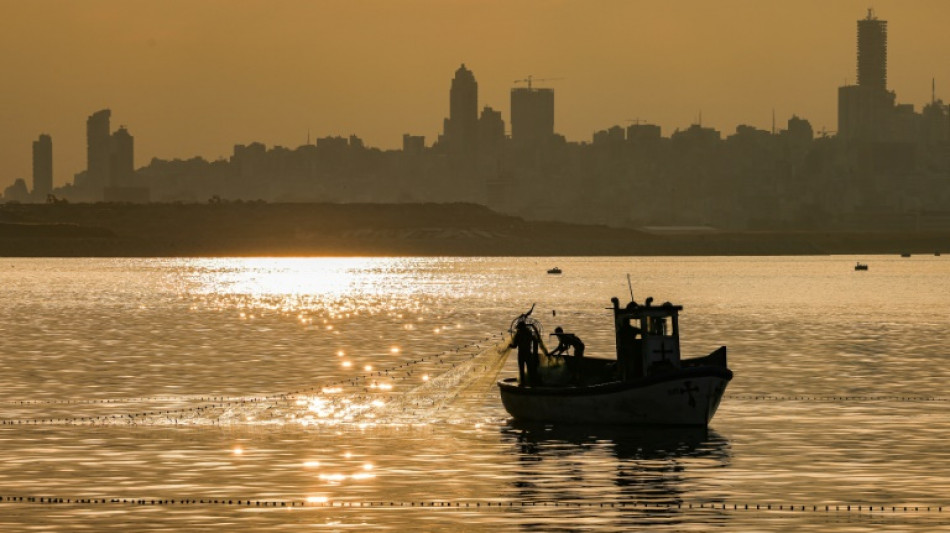
-
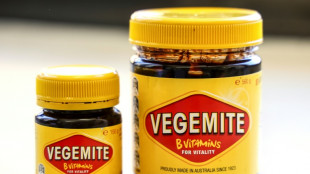 Loaf behind bars: Aussie inmate says Vegemite a human right
Loaf behind bars: Aussie inmate says Vegemite a human right
-
In film's second act, 'Wicked' goes beyond Broadway musical

-
 Asian markets track Wall St down with Nvidia, US jobs in view
Asian markets track Wall St down with Nvidia, US jobs in view
-
Scott Boland: the best 'spare' fast bowler around

-
 Fire and Ashes: England bank on fast bowling barrage in Australia
Fire and Ashes: England bank on fast bowling barrage in Australia
-
North Korea says Seoul-US sub deal will trigger 'nuclear domino' effect
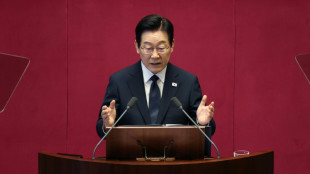
-
 Education for girls hit hard by India's drying wells
Education for girls hit hard by India's drying wells
-
Haitian gangs getting rich off murky market for baby eels
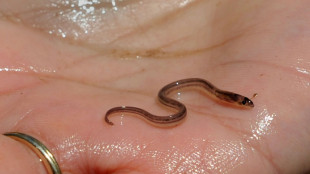
-
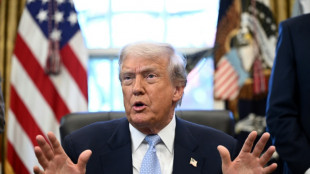 Trump says will talk to Venezuela's Maduro, 'OK' with US strikes on Mexico
Trump says will talk to Venezuela's Maduro, 'OK' with US strikes on Mexico
-
Oscar Piastri wins Australia's top sports honour

-
 'Severely restricted': Russia's Saint Petersburg faces cultural crackdown
'Severely restricted': Russia's Saint Petersburg faces cultural crackdown
-
Polish PM denounces 'sabotage' of railway supply line to Ukraine

-
 UK toughens asylum system with radical overhaul
UK toughens asylum system with radical overhaul
-
Carney's Liberals pass budget, avoiding snap Canada election
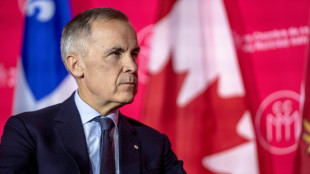
-
 LeBron back in training, edges closer to Lakers return
LeBron back in training, edges closer to Lakers return
-
Climate talks run into night as COP30 hosts seek breakthrough

-
 Germany and Netherlands lock up World Cup spots in style
Germany and Netherlands lock up World Cup spots in style
-
Germany's Woltemade hopes for 2026 World Cup spot after scoring again

-
 Germany 'send message' with Slovakia rout to reach 2026 World Cup
Germany 'send message' with Slovakia rout to reach 2026 World Cup
-
Trump unveils fast-track visas for World Cup ticket holders

-
 Netherlands qualify for World Cup, Poland in play-offs
Netherlands qualify for World Cup, Poland in play-offs
-
Germany crush Slovakia to qualify for 2026 World Cup

-
 Stocks gloomy on earnings and tech jitters, US rate worries
Stocks gloomy on earnings and tech jitters, US rate worries
-
'In it to win it': Australia doubles down on climate hosting bid

-
 Former NFL star Brown could face 30 yrs jail for shooting case: prosecutor
Former NFL star Brown could face 30 yrs jail for shooting case: prosecutor
-
Fate of Canada government hinges on tight budget vote

-
 New research measures how much plastic is lethal for marine life
New research measures how much plastic is lethal for marine life
-
Mbappe, PSG face off in multi-million lawsuit

-
 EU defends carbon tax as ministers take over COP30 negotiations
EU defends carbon tax as ministers take over COP30 negotiations
-
McCartney to release silent AI protest song

-
 Stocks tepid on uncertainty over earnings, tech rally, US rates
Stocks tepid on uncertainty over earnings, tech rally, US rates
-
Louvre shuts gallery over ceiling safety fears

-
 'Stranded, stressed' giraffes in Kenya relocated as habitats encroached
'Stranded, stressed' giraffes in Kenya relocated as habitats encroached
-
US Supreme Court to hear migrant asylum claim case

-
 Western aid cuts could cause 22.6 million deaths, researchers say
Western aid cuts could cause 22.6 million deaths, researchers say
-
Clarke hails Scotland 'legends' ahead of crunch World Cup qualifier

-
 S.Africa says 'suspicious' flights from Israel show 'agenda to cleanse Palestinians'
S.Africa says 'suspicious' flights from Israel show 'agenda to cleanse Palestinians'
-
South Korea pledges to phase out coal plants at COP30

-
 Ex-PSG footballer Hamraoui claims 3.5m euros damages against club
Ex-PSG footballer Hamraoui claims 3.5m euros damages against club
-
Mbappe, PSG in counterclaims worth hundreds of millions

-
 Two newly discovered Bach organ works unveiled in Germany
Two newly discovered Bach organ works unveiled in Germany
-
Stocks lower on uncertainty over earnings, tech rally, US rates

-
 Barca to make long-awaited Camp Nou return on November 22
Barca to make long-awaited Camp Nou return on November 22
-
COP30 talks enter homestretch with UN warning against 'stonewalling'

-
 France makes 'historic' accord to sell Ukraine 100 warplanes
France makes 'historic' accord to sell Ukraine 100 warplanes
-
Delhi car bombing accused appears in Indian court, another suspect held

-
 Emirates orders 65 more Boeing 777X planes despite delays
Emirates orders 65 more Boeing 777X planes despite delays
-
Ex-champion Joshua to fight YouTube star Jake Paul

-
 Bangladesh court sentences ex-PM to be hanged for crimes against humanity
Bangladesh court sentences ex-PM to be hanged for crimes against humanity
-
Trade tensions force EU to cut 2026 eurozone growth forecast


WTO fishing deal: the net results
The World Trade Organization's agreement on fisheries subsidies -- its first environmentally focused accord -- enters into force on Monday after years of thorny negotiations at a time of heightened international trade tensions.
Agreed by more than 100 WTO members, including the United States, the European Union and China, the agreement sets binding rules requiring governments to consider the legality and sustainability of the fishing activities they subsidise.
The discussions towards the deal began all the way back in 2001, with WTO members finally reaching an agreement by consensus in June 2022.
Below are the main points of the agreement, which will be celebrated with a ceremony at the WTO's Geneva headquarters Monday after being ratified by two-thirds of the membership.
Broader rules regarding subsidies for activities that contribute to overcapacity and overfishing remain under negotiation.
- Bans -
The deal bans subsidies to any vessel or operator engaged in illegal, unreported and unregulated (IUU) fishing, or the fishing of overexploited stocks.
However, a country can grant or maintain subsidies implemented "to rebuild the stock to a biologically sustainable level".
The agreement also prohibits subsidies for unregulated fishing on the high seas, including areas outside the jurisdiction of coastal countries, thus providing protection in cases where stock management measures are lacking.
According to a widely cited study in the Marine Policy journal, global fisheries subsidies totalled $35.4 billion in 2018, of which $22 billion contributed to increased fishing fleet capacity.
- Notification and dispute settlement -
The agreement says countries must "take special care and exercise due restraint" when granting subsidies to vessels not flying their own flag, and when granting them to fishing or related activities if the status of the stocks concerned is unknown.
Besides regular notifications of subsidies, WTO members are required to update the organisation on how the agreement is being implemented.
This includes, for example, the status of fish stocks, information on vessels receiving subsidies, and a list of vessels and operators that the country has determined to be engaged in IUU fishing.
In the event of disagreements, countries can refer matters to the WTO's dispute settlement body.
- Developing countries -
The agreement provides a "peace clause" to the world's least-developed countries (LDCs) and developing countries, exempting them from subsidy bans within their own exclusive economic zones for two years.
Furthermore, developing countries and LDCs whose annual share of the global fish catch does not exceed 0.8 percent can submit their fisheries notifications to the WTO every four years instead of every two years.
They will also benefit from technical assistance, and the WTO has set up a special fund to support them, which to date has received $18 million in voluntary contributions.
- Agreement could be thrown overboard -
If the second agreement outlining comprehensive rules on overcapacity and overfishing is not adopted within four years, the first agreement will be "immediately terminated", unless WTO members decide otherwise.
Y.Zaher--SF-PST
